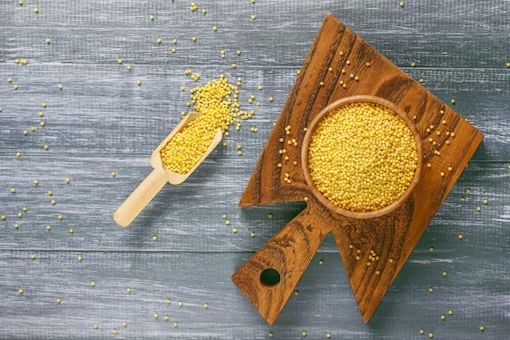Millet is a group of highly nutritious grains that have been a staple food in many cultures for centuries. It is packed with essential nutrients, such as fiber, protein, vitamins, and minerals, making it an ideal food for patients with type 2 diabetes. Millets have a low glycemic index, which means they don’t cause a sudden spike in blood sugar levels, making them an excellent choice for people who need to manage their blood sugar levels.
Let’s explore some delicious millet recipes for patients suffering from type 2 diabetes. Whether you prefer savory or sweet, breakfast, lunch, or dinner, we’ve got you covered. These recipes are not only diabetic-friendly but also vegetarian, gluten-free, and perfect for those who are health-conscious. So, let’s dive into the world of millet and explore some fantastic recipes that can help you manage your diabetes while still enjoying delicious food. Saloni Jhaveri, In-house nutritionist, Conscious Food, shares few recipes for diabetic patients.
BAJRA DOSA RECIPE
Ingredients
- Bajra Flour/ Kambu Maavu – 2.5 cups
- Udad dal – ½ cup
- Methi (fenugreek) seds – 3/4th tsp
- Water as needed
- Salt to taste – 1 tsp or more
Instructions
Preparation
- Wash and soak urad dal & fenugreek seeds with enough water for 2-3 hours.
Method
- Start grinding the urad dal with fenugreek seeds first by adding little water in frequent intervals. When the bubbles start to appear and the batter is fluffy, it’s done.
- Take bajra flour in a vessel and add enough water. Mix it well with enough water until pouring consistency is reached.
- Then add the urad dal batter to this liquid bajra flour. Add salt. Mix well with your hands. Let it ferment for overnight or at least eight hours till the batter rises well.
- To make dosa’s, heat a tawa (if you have a cast iron tawa, please use that), spread the dosa thin in circular motion. Sprinkle ½ teaspoon of oil along the edges. Cook it for 2 minutes. Once done, flip the dosa and cook it for a minute and remove the pan after.
FOXTAIL MILLET AND POHA DOSA
Ingredients
- Foxtail Millets – 2 cup
- Poha (flattened rice) – 1/2 cup
- Urad Dal – 1 cup
- Methi/Fenugreek Seeds – 1/2 tsp
Method
- Keep all the ingredients ready.
- Add Foxtail Millet and poha in a bowl, add sufficient water, squeeze and wash, strain and soak it separately for 4 to 5 hours.
- In another bowl, take Urad Dal and Methi Seeds/Fenugreek seeds and add sufficient water, squeeze and wash, strain and soak it separately for 4 to 5 hours.
- Add the Rice and Foxtail Millet mixture in the mixer, grind to a coarse texture.
- Transfer the grinder mixture to a big glass bowl.
- Now add the soaked urad dal and methi seeds to a mixer, grind well for a smooth, bubbly texture. Once the batter is ready, transfer it to the glass bowl containing the previous mixture.
- Add the required amount of Salt and allow the Foxtail Millet Dosa batter to ferment for 8 hours.
- After fermentation for 8 hours, the fluffy batter is ready. Add water to bring it to Dosa Batter consistency.
- Pour the Foxtail Millet Dosa batter onto the preheated non-stick tawa. Use a tsp or the required amount of oil around the edges and cook for a light crispy healthy Foxtail Millet Dosa.
BASIC MIXED MILLET DOSA RECIPE
Ingredients
- 1 part each of 3 different millets – can use Kodri, kangni and sama or use any 3 millets – besides Bajra which is slightly stickier, options are the above 3 or jowar, hari kangni, chena, jhangora.
- 1 part udad dal.
- 1 teaspoon methi seeds.
Method
- Soak the dals and the millets together for 8 hours. Soak the methi seeds separately.
- Grind all together with the soaked methi seeds to a slightly grainy consistency. Leave to ferment in a covered bowl overnight. Ensure that there is space for the batter to rise in the bowl.
- Once ready, add salt to taste and ½ a cup of any of the above ingredients mashed smoothly (either mashed carrots, or mashed beets or mashed onion and sweet potato) and cook.
- To cook, use the back of a ladle to spread the batter on a well heated tava. Spoon 1 – 2 tsp of oil on the edges and lift once crisp.
- Feel free to experiment with other colors like green chavli bhaji (the taste is milder than spinach which might be bitter) or pumpkin and yellow peppers.
In conclusion, millets are a nutritious and tasty alternative to traditional staple foods and offer numerous benefits for people. So, if you’re looking for a healthy and delicious way to manage your diabetes and reach your weight loss goals, consider incorporating millets into your diet.


